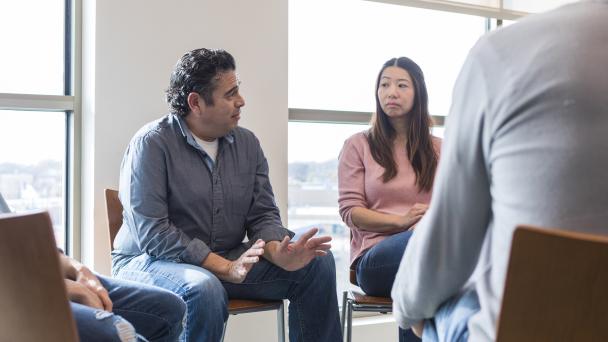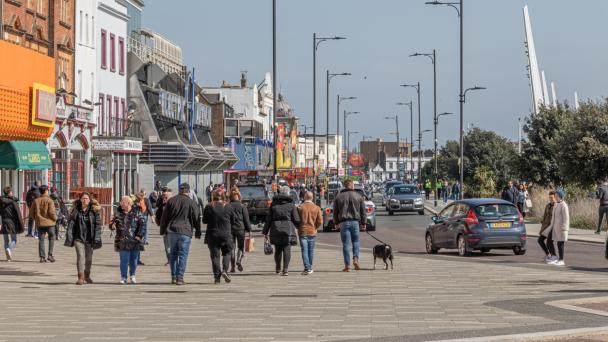Using health data to identify and approach people about health and care research: A Public Dialogue

As part of our ongoing research about public attitudes towards post-Brexit policy, we ran a large scale Deliberative Polling event in October 2020, bringing together over 200 members of the British public online. Over one weekend, participants debated the future of immigration, food policy and consumer regulation in small groups chaired by neutral moderators. After discussing each topic, groups also posed questions to a panel of subject-matter experts representing different points of view.
Today, in the first half of a two-part blog post, NatCen researchers Maria David and Josh Vey reflect on our approach to improving participants’ experiences and preparing for this unique large-scale event.
In June 2019 we delivered the first of two Deliberative Polls with the British public. This was, we believe, a UK first as we used videoconferencing software to run the poll entirely online.
In January 2020, we were ramping up towards our second Poll – an in-person event. By March the venue was booked, and we had started recruiting participants and most of our plans were in place.
No more than two weeks later and our plans were quickly put on hold, due to the escalating Covid-19 pandemic. With the introduction of social distancing measures, we took the decision to switch from a face to face event and return to an online one, set to take place in October rather than June.
We had the capability to do this from our experience in the previous year, but we also learned lessons from that original experience of trialling online deliberation. In this way, we set about preparing our participants and our moderators to ensure the event was a success.
In taking our event online we feared it might feel less ‘real’ – not something that requires journey planning or childcare arrangements but simply a matter of joining a video call. This posed the risk that participants might forget about the event come October, not get around to reading any briefing materials, or even decide to spend the weekend away from their laptop, should the sun come out. Indeed, we knew from 2019 that the attrition rate for our event was higher than in comparable face to face exercises.
In response, our aim was to concentrate on replicating the look and feel of a face to face event. After all, though online, the event was not substantially different in aim or format and so there was no reason it should feel any less important or exciting. We just had to approach it with a little more creativity.
The first step was to send participants an official confirmation letter through the post. In the numerous emails and letters that followed we ensured that our communications shared the same style and tone. In the lead up to the event, Ceri Davies and John Curtice, our project leads, recorded a series of videos with James Fishkin, one of our collaborators (and the originator of Deliberative Polling), explaining what the event was all about and why participants should take part.
Finally, there was the matter of briefing materials. Ahead of the event, we needed every participant to read a full briefing document on the three topics of discussion. One thing we learned from last year’s event feedback is that participants don’t take well to reading 60-page briefing materials! For this event, we separated our briefing materials into four, professionally designed, 20-page documents. The most important document, a Topic Summary, was sent by post while the rest were uploaded to our website.

Receiving a copy of the ‘Topic Summary’ in the post was enough to get the research team excited about the event – hopefully it had the same effect on attendees!
Getting to grips with Zoom was the first adjustment to a life spent at home for many of us during the pandemic, but we couldn’t assume that every participant would have the technology or confidence required to use it. In expectation of this, we offered participants varying levels of support.
For those unfamiliar with Zoom, we created a user guide covering the basic functions. We also offered a number of Zoom ‘drop-ins’ and one-on-one practice sessions in the lead up to the event. For those without WiFi, or with an intermittent connection, we were able to provide MiFi devices – an important development in NatCen’s capability to support the inclusion of people in this group.
This all required additional planning, but it improved the participant experience significantly. Much of the troubleshooting that would otherwise have disrupted the event had been smoothed out in the days before. Taking these steps also offered an effective way of enabling participation for key groups who people who don’t typically take part in online research such as this.
To take care of up to 400 participants during the weekend, we needed a large group of well-prepared facilitators, so we recruited 31 internal and external colleagues. But how do you explain the Future of Britain event to someone who did not spend months organising it? How do you make everyone understand this is a project like no other?
For everyone who volunteered to moderate, there was a lot to take in. They had to be familiar with the briefing documents sent to participants, alongside moderator guides! The event spanned across two days and there were numerous tasks, in addition to facilitation, to be completed with clocklike precision.
Our approach was to organise two briefing sessions, with distinctive goals. The first Zoom training session focused on the rationale of the project and the role of the moderator in deliberative research. Moderators learned the principles of Deliberative Polling and received advice on making participants feel welcome and managing challenging situations. A lot of questions were asked, both to the research team and our collaborators at Stanford University, including James Fishkin.
Closer to the event, we also organised a shorter briefing session covering logistical details. Moderators were instructed about the technical details of using Zoom for the event, about contacting the event organisers for support and sending participants’ questions to experts. At the very start of the session, questions were pouring in. However, by the end of the briefing, everyone had their questions answered and were confident in their roles, and looking forward to the event!
In the second half of this post Josh and Maria will discuss what it was like to take part in the deliberative weekend from the perspective of both participants and facilitators.




Receive a regular update, sent directly to your inbox, with a summary of our current events, research, blogs and comment.
Subscribe